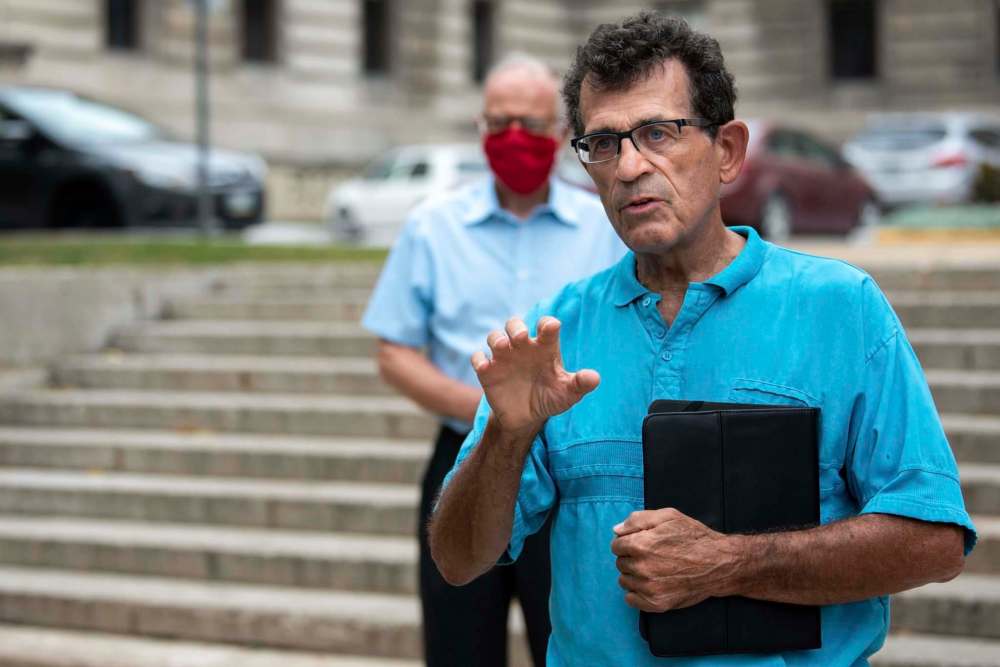Full review needed for sand-mining proposal
Read this article for free:
or
Already have an account? Log in here »
To continue reading, please subscribe:
Monthly Digital Subscription
$0 for the first 4 weeks*
- Enjoy unlimited reading on winnipegfreepress.com
- Read the E-Edition, our digital replica newspaper
- Access News Break, our award-winning app
- Play interactive puzzles
*No charge for 4 weeks then price increases to the regular rate of $19.00 plus GST every four weeks. Offer available to new and qualified returning subscribers only. Cancel any time.
Monthly Digital Subscription
$4.75/week*
- Enjoy unlimited reading on winnipegfreepress.com
- Read the E-Edition, our digital replica newspaper
- Access News Break, our award-winning app
- Play interactive puzzles
*Billed as $19 plus GST every four weeks. Cancel any time.
To continue reading, please subscribe:
Add Free Press access to your Brandon Sun subscription for only an additional
$1 for the first 4 weeks*
*Your next subscription payment will increase by $1.00 and you will be charged $16.99 plus GST for four weeks. After four weeks, your payment will increase to $23.99 plus GST every four weeks.
Read unlimited articles for free today:
or
Already have an account? Log in here »
Hey there, time traveller!
This article was published 22/09/2020 (1901 days ago), so information in it may no longer be current.
The provincial government is currently considering a plan for a sand-processing facility about 35 kilometres east of Winnipeg. Given the controversy surrounding this proposal, officials would do well to expand their due diligence into double-due diligence.
CanWhite Sands wants to remove 1.6 million tonnes of sand per year at the facility in the RM of Springfield, for fracking and other purposes, but the proposal has incurred strong opposition from area residents, environmentalists and opposition politicians who have also alleged unethical business dealings in the past by the CEO of CanWhite.
Despite the protests, the company wants to go ahead because it recognizes good sand when it sees it. The silica sand in the area is of very high purity. It’s ideal to produce silica products such as fiber-optic cable and silicon metal for solar cells, electronic components, construction materials and art supplies, according to the Manitoba Prospectors and Developers Association.
The plant and related jobs would bring economic benefits to the area around the town of Vivian, but an organized effort by some local residents has rung alarm bells about possible environmental consequences. Their concerns were put forth publicly by Dennis LeNeveu, a biophysicist and a former safety officer at Atomic Energy of Canada Ltd.
The CanWhite plan is to pump sand and water up from the sandstone aquifer, which will be a draw on the aquifer. Mr. LeNeveu said the water could become contaminated when the pyrite in the shale hits the surface, oxidizes and becomes acidic, but acid also will form right in the aquifer before anything hits the surface because of air injection into the aquifer, which is the process used to extract the sand.
He said there is a risk of contaminating the source of drinking water for many residents of southeast Manitoba.
A group called What The Frack Manitoba warns the Brokenhead River could become a “toxic dumping ground” for the processing plant, and has publicly called on the province to suspend its approval process until the federal government gets the necessary information to weigh possible adverse impacts, such as violating the federal Fisheries Act by threatening aquatic life.
The environmental protests about the proposed plant have been supplemented by concerns about the business history of Feisal Somji, the CEO of CanWhite Sands. At a press conference last Thursday, Liberal MLAs disclosed Mr. Somji is also the former CEO of Prize Mining Corp., which in 2019 was ordered by the Alberta Securities Commission to cease trading after it was accusing of “making misrepresentations and failing to comply with its continuous disclosure obligations.”
The commission ordered the company to issue a news release, disclosing that of the $6.5 million it reportedly raised from investors, $5.5 million was returned to some of them for “consulting agreements.”

Mr. Somji complied with the commission’s order to come clean publicly about his investors and, to be fair, there was no finding that he engaged in any illegal activities that would prohibit him from doing business in Manitoba. Still, the ploy in Alberta to misrepresent the financial commitment of investors should prompt Manitoba officials to intensely scrutinize his proposal for the sand-processing facility.
The Liberals are calling for a full review of the project before the Clean Environment Commission. That would allow public hearings, in which the company would be questioned about its plans for Manitoba.
Such public hearings are warranted. Given the warning that the project threatens the sustainability of the aquifer that underlies much of southeastern Manitoba, it’s crucial that the environmental impact of the proposal be fully investigated before a shovel hits the sand.
History
Updated on Tuesday, September 22, 2020 5:36 PM CDT: Fixes typo.








